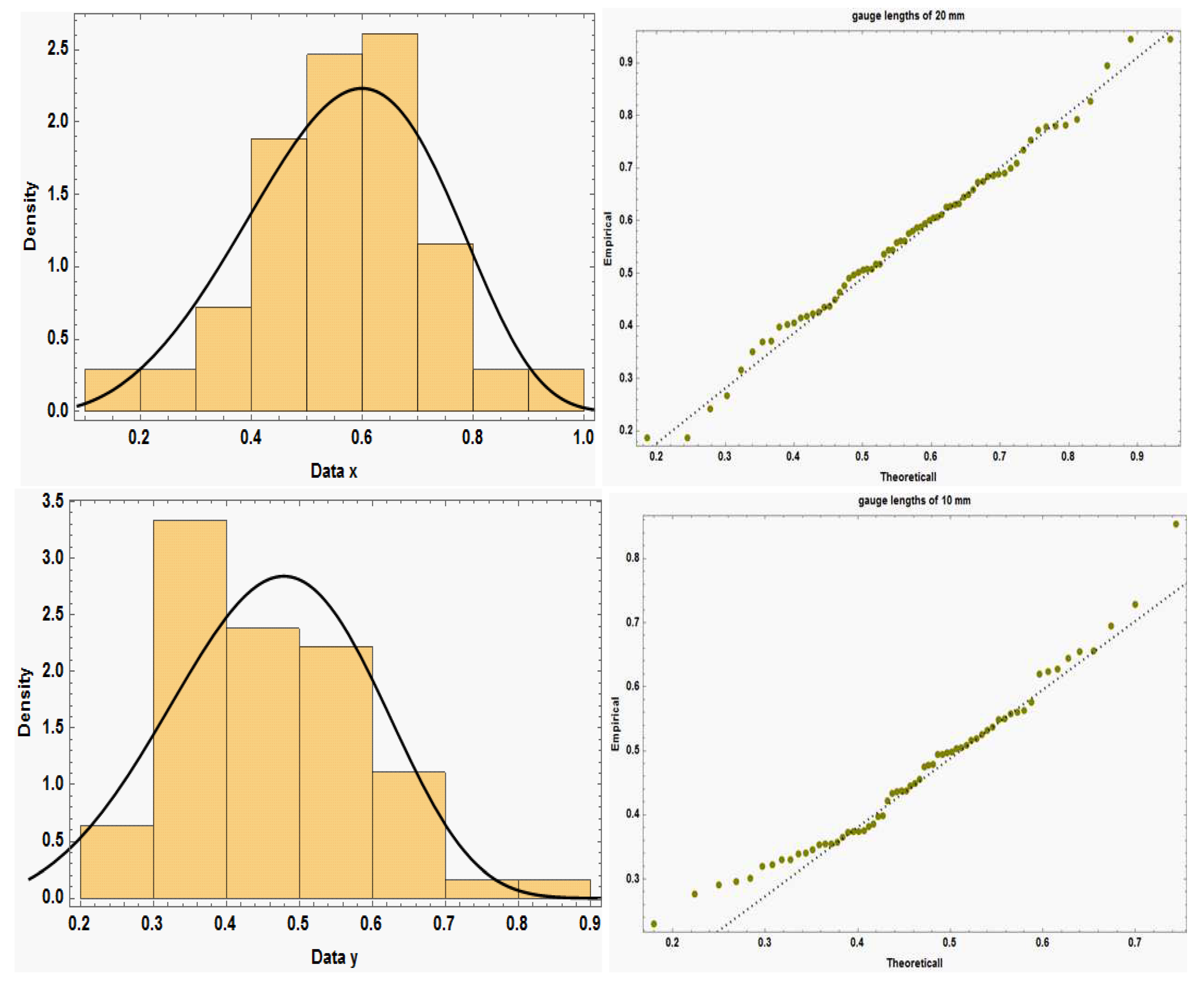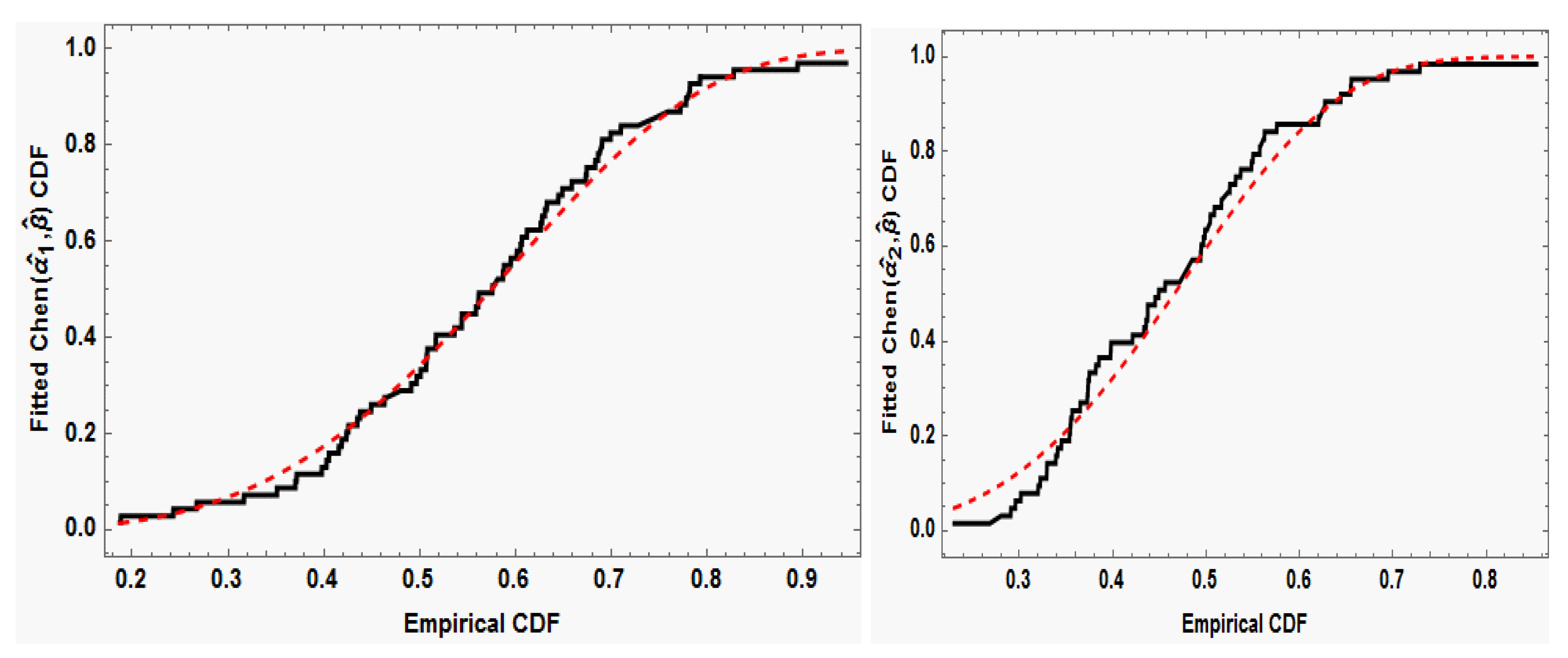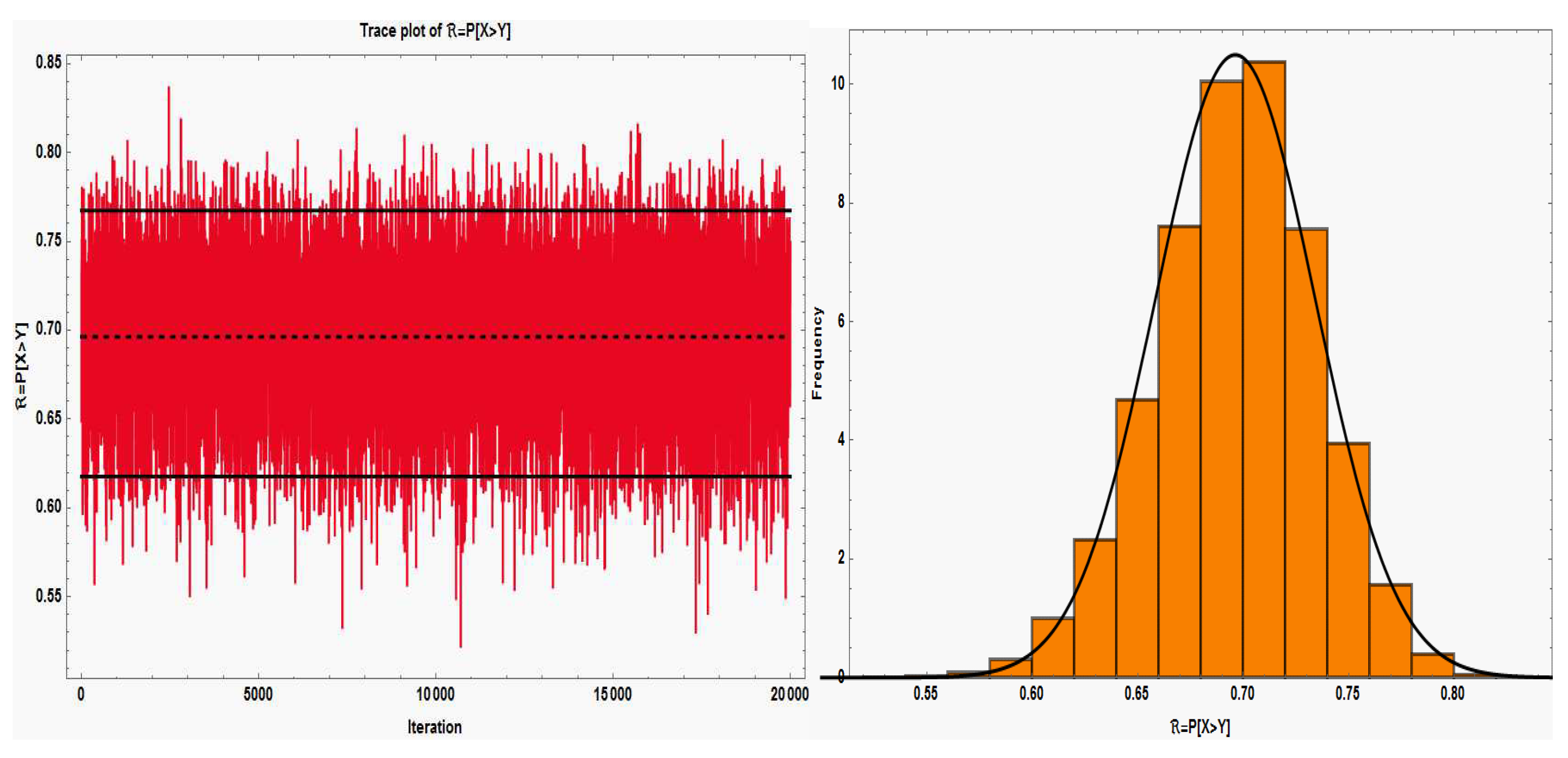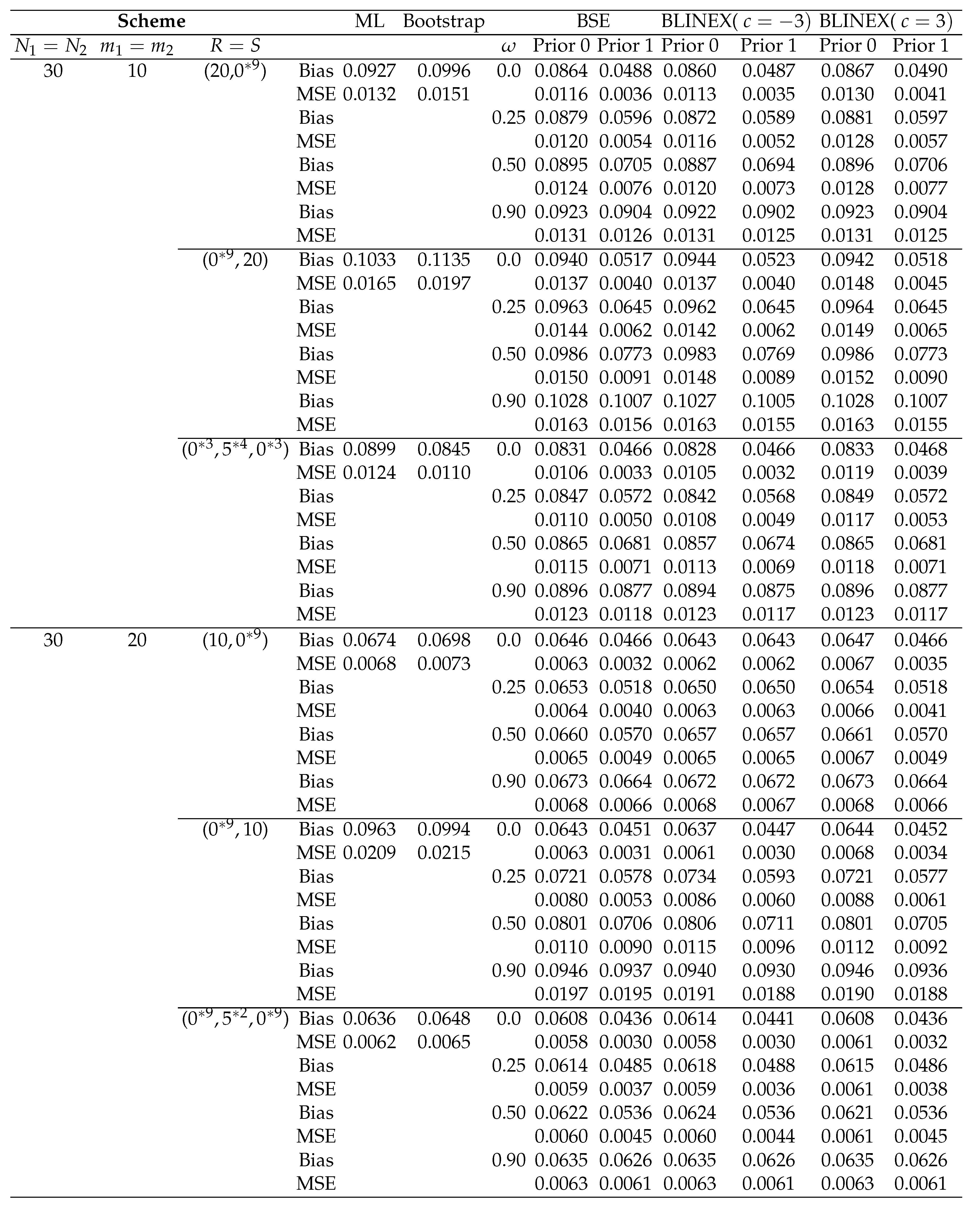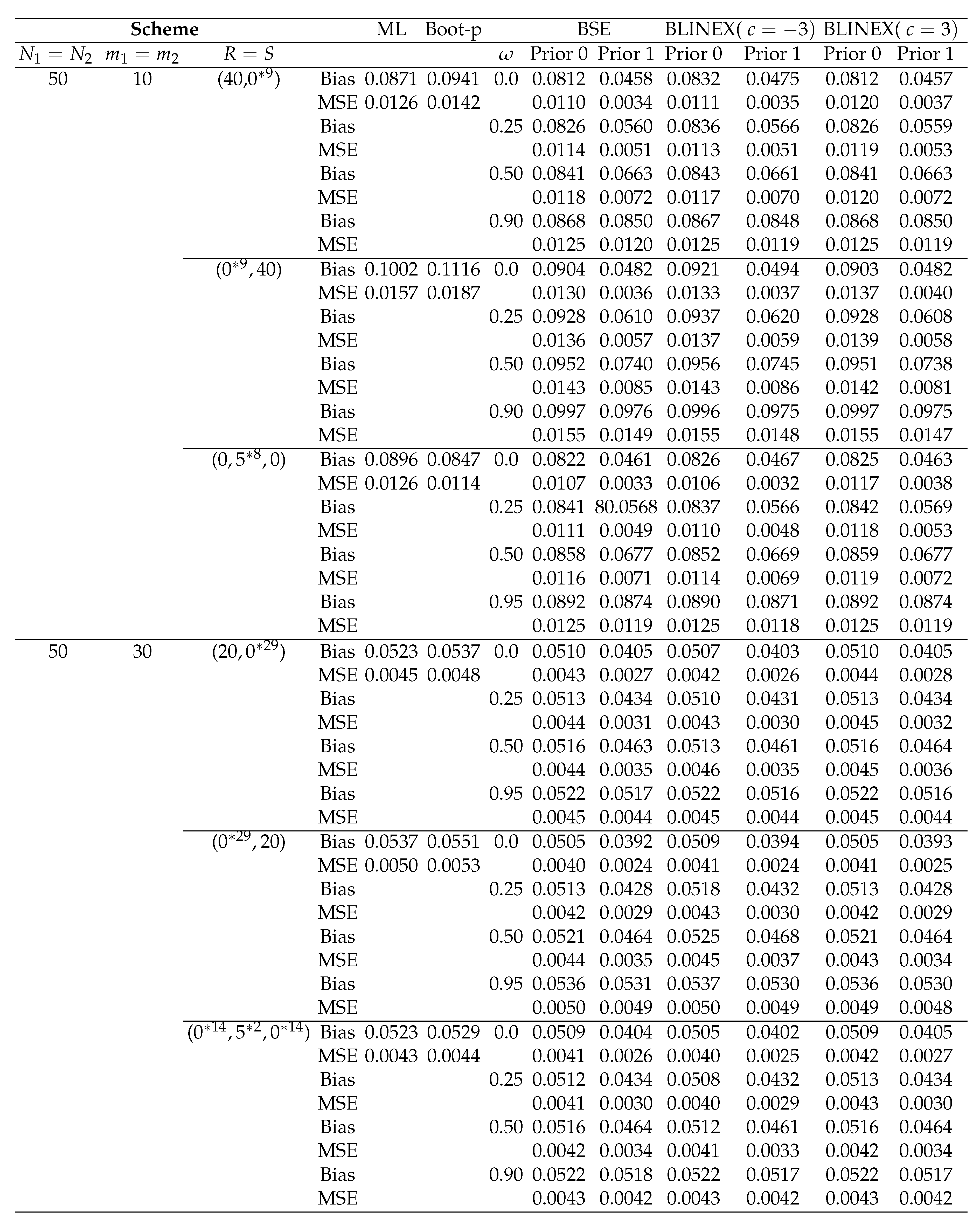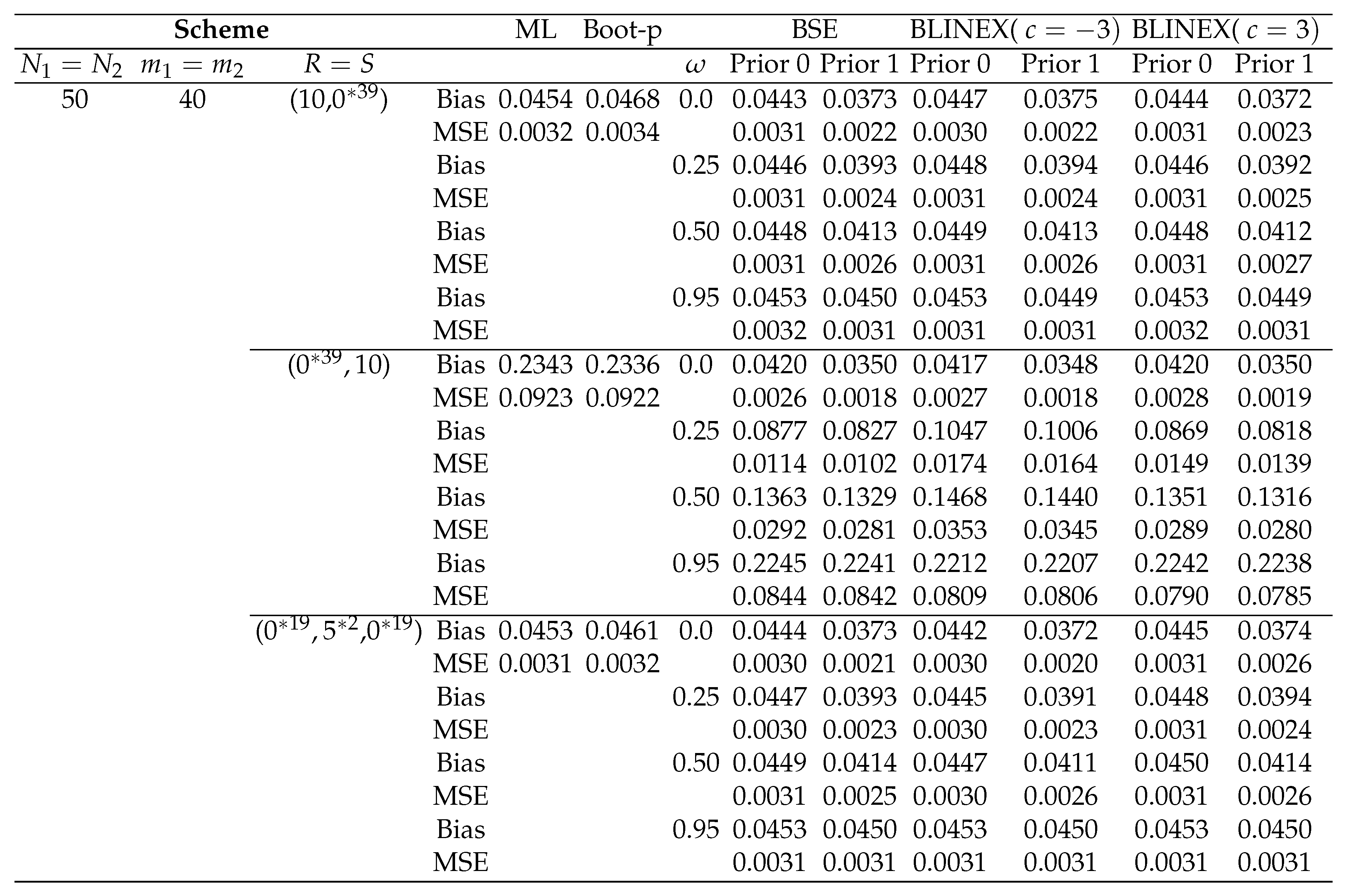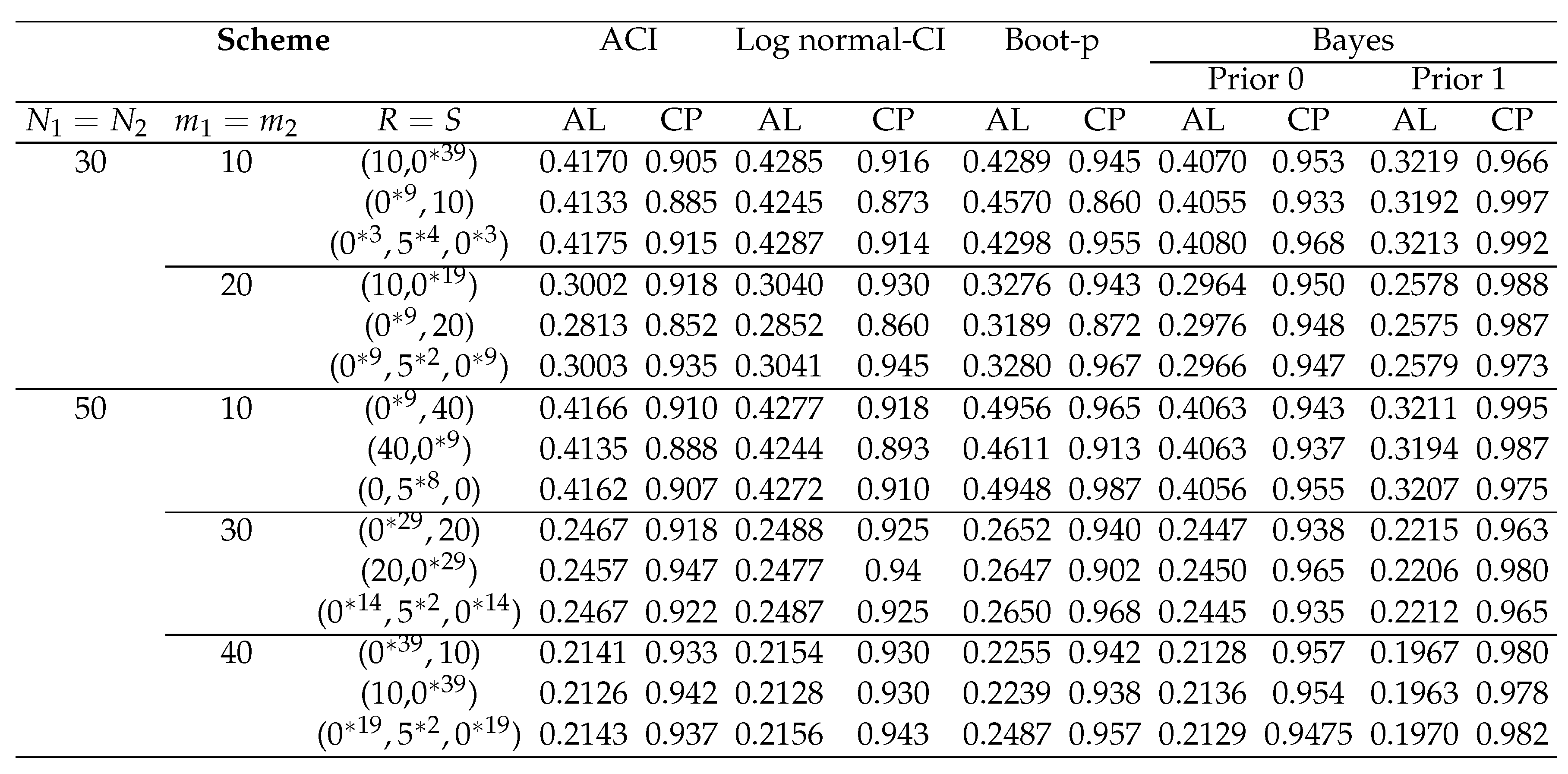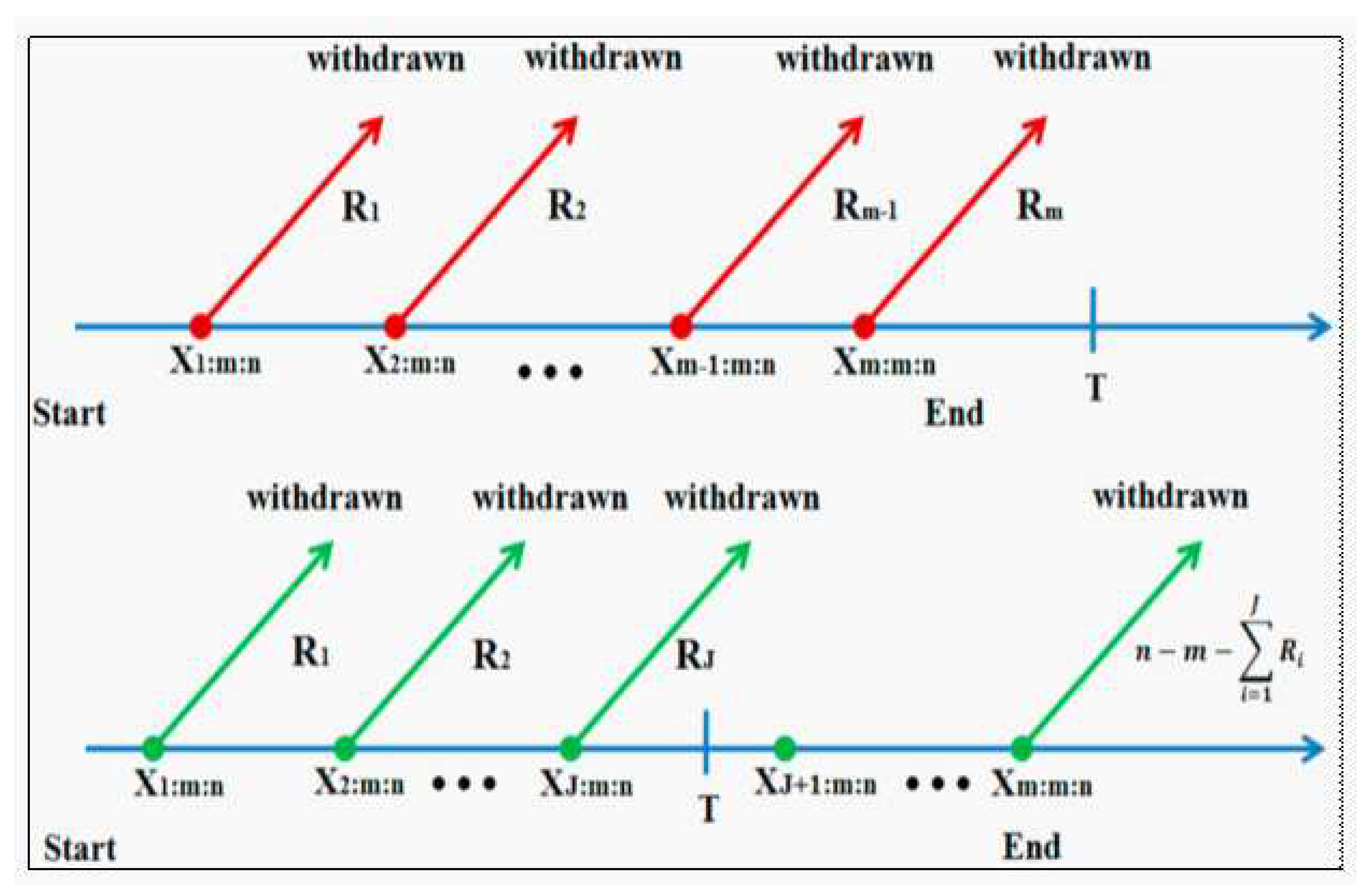1. Introduction
Modern industrial systems are frequently created with exacting criteria of quality. There are many different methods used to improve system reliability. A redundant structure is a method for further developing system reliability. For instance, a cloud storage server typically has a minimum of one backup to assist users in protecting sensitive data. In the same vein, a commercial aircraft is equipped with a backup engine for use in the event of unexpected malfunctions. In many industrial products, such as production systems, pump systems, power generation systems, etc. The reliability of systems is impacted by a number of factors when they are added to be used within the actual environment, including operating environments, outdoor shocks, operators, and so on. One way to look at these factors is as stresses the system experiences while it is operating. In such situations, the stress-strength (S-S) model is normally used to evaluate the parallel machine’s reliability. The S-S version, first offered through Birnbaum and McCarty (1958), is one of the most widely used reliability fashions. For this model, it fails if its stress exceeds its strength. Therefore, device reliability can be described as the probability that the device’s strength exceeds its stress. That is expressed mathematically in the form , where X stands for the stress variable and Y for the system’s strength. Numerous statistical issues, including those involving quality control, engineering, clinical, and biostatistics, have found use for the S-S model. In the context of medical research, for instance, the variable ℜ quantifies the efficacy of a novel treatment in relation to its control; in this case, X and Y stand for the new treatment’s and the control’s respective effects. Similar to this, in engineering studies, ℜ stands for the likelihood that a system component’s strength (Y) will exceed the system’s external stress (X). An overview of all the techniques and consequences related to the S-S version is provided by Kotz et al. (2003).
Evaluating the reliability of the S-S model using different statistical techniques has been the focus of a lot of research lately. For example, Gittani et al. (2015) presented point and interval estimates of the reliability of the S-S model under a Lindley power distribution. They used maximum likelihood (ML) estimators as well as parametric and nonparametric bootstrapping techniques. Using recorded samples from two parameter generalized exponential distribution, Asgharzadeh et al. (2017) estimated the S-S model . The process of establishing a generalized inference on the S-S model based on the unknown parameters of the generalized exponential distribution was carried out by Wang et al. (2018). With the growing interest in this system and the importance of Chen distribution, which has become evident in the past two decades, in order to obtain point and interval estimates for a multicomponent ℜ of an S-out-of-j system, Kayal et al. (2020) used classical and Bayesian methods under the assumption that both the S-S variables follow a Chen distribution with a common shape parameter. The reliability estimation of ℜ when the failure times are progressively Type-II censored and both the latent strength and stress variables originate from the inverse exponential Rayleigh distribution was discussed by Ma et al. (2023). Moreover, Agiwal (2023) developed a Bayesian estimation method to estimate ℜ where X and Y are inverse Chen random variables. Recently, Sarhan and Tolba (2023) have given attention to the estimation of ℜ for step-stress partial acceleration life testing, when the stress and strength additives are independent random variables generated from Weibull distributions with specific shape and scale parameters.
To gather information about the lifetime and reliability characteristics of products, various units are typically used during life testing experiments. In actuality, it is sometimes not possible to finish experiments until all failures are noted due to time and financial constraints. To increase test efficiency in this regard, several censoring schemes and testing techniques are suggested. In practise, the most commonly used methods in the literature are type I and type II control. According to these methods, life tests terminate or stop after a specified time or a specified number of failures, respectively. Through various life testing experiments, there are many different challenges that experimenters face in order to be able to control the testing time as well as keep the experimental units intact, so stopping the experiment before all experimental units fail is one of the solutions to achieve these goals. This is done through the use of control structures that rely on deferring some active devices from the experiment. The progressive censoring system is considered one of the experimental designs commonly used in recent years, as through this system, survival units are arbitrarily removed from the test at any stage of the test. As a result, it is more adaptable and efficient than conventional censoring techniques. Over time, numerous models of progressive censorship have been discussed. According to this model, censoring has been divided into two parts: when the experiment ends after a specific time, this section is called progressive censoring of the first type, while the second part is progressive censoring of the second type, and in this section the experiment stops after a predetermined number of failures appear. Through both sections, experimenters will be able to freely remove test units during the experiment at non-terminal times. Whithin a type-II progressive censoring scheme, to test the life of units, the experimenter puts n units through the test at time zero, and only m units that fail completely are observed. With the primary failure, which may take the shape , is randomly eliminated from the final devices within the test. At the time of the second failure , the experimenter selects a random number of final units, let it be , and they are removed from the experiment. Finally, in the same sequence, at the time of the mth failure, the experimenter removes all remaining units from the experiment, where
When test units are highly reliable, the long testing time represents one of the main drawbacks of the progressive type-II censoring model. For this reason, Ng et al. (2009) suggested an improved model (see
Figure 1) that allows for adjustments to the censoring scheme throughout the experiment. This improved model is known in the literature as the adaptive type-II progressive censoring model. The technique of this model can be explained as follows.
(1) First, the effective sample size m, the number of units to be tested n, the progressive censoring scheme () and the time point T must be determined in advance before the beginning of the experiment.
(2) As indicated by the preceding progressive censoring strategy, units are arbitrarily eliminated from the test at the moment of the first failure . units are also arbitrarily removed from the test at the moment of the second failure, , and so on.
(3) When the mth failure occurs before time T (i.e., ), the test ends at this point with the unchanged progressive censoring scheme (), and we will have the standard progressive type-II censoring. with the unchanged progressive censoring scheme (). Where
(4) In the event where , where and is the Jth failure time occur before the time T, then no surviving item will be removed from the test by placing , and at the time all remaining units are removed, where . Because of this, the progressive censoring scheme that is being used in this instance is ().
(5) After running the previously specified test, we may get the following adaptive progressive type-II censored observation data
More works presented on the adaptive type-II progressive censoring model, we referred to Almuqrin et al. (2023) and the references contained within it.
Many scientific and engineering applications use a variety of distributions, including gamma, exponential, Rayleigh, normal, Weibull, and others, to model the lifetime characteristic of products. Among the various probabilistic models, bathtub-shaped failure rate distributions have drawn a lot of attention. These models are highly helpful for studying complex systems or sub-systems and for making decisions, particularly when the target product’s entire life cycle needs to be modelled. Regarding this, numerous authors have proposed and discussed in literature a variety of probability models featuring bathtub-shaped failure rate functions. The bathtub-shaped hazard function offers a suitable conceptual model for the lifespan of humans as well as certain mechanical and electronic products. Xie and Lai (1995), Wang (2002), and Xie et al. (2002) are only a few of the writers whose articles contain references to the earlier comprehensive work on parametric probability distributions with bathtub-shaped failure rate function. The Chen distribution is considered one of the most important distributions that contain bathtub curves.
Chen (2000) introduced a distribution that is often called the Chen or bathtub-shaped distribution with two parameters in the literature. It is a significant probability model that is frequently applied to lifetime analysis. This probability model is truly crucial for studying physical events for which the hazard rate function predicts bathtub-shaped behavior. It gives complex systems whose failure rates vary over time a flexible way to be modelled. One of the primary features of the Chen distribution is its bathtub-shaped failure rate curve, which has three unique phases (decreasing, constant, and ascending) and may be used to describe a wide range of systems. This curve has a wide range of potential applications, including researching the efficacy of medications or therapies across various age groups. It can be helpful when analyzing mortality data as well. When modeling the reliability of items or systems that are prone to wear and tear, one might employ the Chen distribution. The following are the cumulative density function (CDF) and probability density function (PDF) for the Chen distribution:
and
Here, both
and
are known as shape parameters. As for the hazard rate function (HRF) for the Chen distribution, it is given in the following form
The Chen distribution’s HRF (3) has a bathtub form with a minimum at
, when
. It increases when
. This distribution may be used to describe many kinds of failure-time data quite well since it is fairly adaptable. For example, if we select
in (1), this distribution further transforms into a Gompertz distribution with parameters 1 and
. When
, the exponential power distribution results. If
Chen(
) and we take
, the distribution turns into a Weibull distribution with parameters
and
.
Compared to other two-parameter models, this distribution stands out due to a few key features, including a bathtub-shaped hazard rate function and closed-form joint confidence regions and shape parameter confidence intervals. As a result, researchers have paid close attention to this distribution in recent years due to its broad applicability in simulating a variety of real-life phenomena. For a brief review, Using progressive type-II censoring, Wu (2008) calculated the MLEs of the unknown parameters and approximated their intervals. Rastogi, Tripathi, and Wu (2012) achieved the Bayesian inference of this distribution against various symmetric and asymmetric loss functions. Using the likelihood and Bayes approaches, Sarhan et al. (2015) determined the reliability where X and Y are two independent r.v.s. with a two-parameter Chen distribution. Tarvirdizade and Ahmadpour (2016), and Raqab et al. (2018) have studied the estimation of the S-S reliability for the two-parameter Chen model based on upper record values. Using data that was progressively censored, Kayal et al. (2017) looked at the Bayesian one and two sample prediction. Ahmed et al. (2020) observed the Chen distribution for a competitive risk model with progressive type-II censored data. The S-S reliability of this lifespan distribution was investigated by Shoaee and Khorram (2015) using type-II progressively censored data. According to recent observations by Wang et al. (2022) the multicomponent system is reliable when both stress and strength follow Chen distribution.
One significant phenomenon in life testing studies that we mention is the S-S models. While there is a large body of literature on the inference processes of S-S models under full samples, little emphasis has been given to the case of censored data, specifically type II adaptive progressive censored data. From this, our objective became clear. This article’s primary goal is to use adaptive progressive type censored data to estimate the S-S Reliability ℜ, in the case when X and Y are Chen distributions’ independent variables.
The following describes the paper’s methodology: First, we’ll estimate ℜ using the ML technique. Next we will discuss the asymptotic confidence interval of ℜ. The delta approach is used to estimate the variance of the ℜ estimator in order to achieve the required interval. Second, the balanced loss function is taken into account in order to compute Bayesian estimates of ℜ, with special attention paid to the balanced square error (BLINEX) loss function (BSEL) and the balanced exponential loss function. In the last ten years, the Markov chain Monte Carlo technique has become a popular solution to the Bayesian approach to deal with the problem of many integrals arising in the posterior distribution. Using this technique, we calculate the Bayes estimates and credible intervals for ℜ. A comprehensive numerical comparison of the presented estimates with respect to means squared errors, coverage probabilities, and confidence lengths is carried out.
The structure of the paper is as follows after this introduction.
Section 2: Here, we give the expression for
ℜ of Chen distribution. The ML estimate of
ℜ and the associated approximate confidence interval as will as boot-p confidence interval are also discussed. In
Section 3, we derive the Bayesian estimate
ℜ and the its credible interval using the Gibbs technique within Metropolis-Hastings. In Section 6 we present an examination of an actual data set. In
Section 5, we do a Monte Carlo simulation analysis to compare the suggested values of
ℜ. In Section 6, we finally bring the article to a close.
2. Maximum Likelihood Estimation of ℜ
Given independent strength and stress random variables
X and
Y that have parameters (
) and (
) correspondingly, according to Chen distributions, the reliability of the component is defined as
It is worth noting that the evaluation depends on whether this probability () is less than or greater than . The result is evaluated and interpreted as follows:
- The lifetime of the two products or any two units is equal if .
- If , the lifetime of Unit/Product 1 exceeds that of Unit/Product 2. For example, if , Unit/Product 1 is better than Unit/Product 2 with a probability of 70%.
- If
ℜ < 0.5, the lifetime of Unit/Product 2 exceeds that of Unit/Product 1. For example, if
, Unit/Product 2 is better than Unit/Product 1 with a
probability (
). The adaptive type-II censored sample is used in this part to determine the MLE of
ℜ.Since
ℜ is independent of the common shape parameter
in this case, obtaining
ℜ is a straightforward process using Equation (
4) provided that the values of the parameters
and
are known or estimated using different estimation methods.
Suppose is an adaptive type-II progressive censored sample from Ch() with the scheme {} such that . Additionally, be an adaptive type-II progressive censored sample from Ch() under the scheme {} such that .
According to the two independent random samples
X and
Y, the likelihood function (LF) is provided by
where
and
Wu (2015) provides the likelihood function (5) for
ℜ in the progressive censored sample case, which is produced in the situation
. Moreover, the likelihood function for
ℜ in the complete sample is reached when
and
, as reported by Sarhan et al. (2015).
The following may be used to represent the LF for the observed sample data,
X and
Y, using Equations (1), (2), and (5):
Ignoring the additive constants
and
, the log-LF, say
=
(
) is given by:
The first order derivatives of the log-likelihood function, with respect to
,
and
are
and
From (8) and (9), we obtain
where,
and
In the case that the parameter
is known, the MLE of
and
can be obtained directory from the Equation (
11). But, when the all parameters are unknown, the parameter
will be estimated by maximizing the profile log-likelihood function
, with respect to
by solving the following nonlinear equation:
where
and
This non-linear Equation (
14) has a fixed point solution at
, which may be found by using the following straightforward iterative method
Where, The
kth iteration of
is denoted by
. The process of iteration ought to be terminated when
| is small enough.
Equation (
11) may now be used to get
and
as
and
, respectively, by using
. An easy way to obtain MLE
of
ℜ is to use the invariant properties of MLEs. Afterwards,
is obtained from (4) as follows:
2.1. Asymptotic Confidence Interval of ℜ
Here, we construct asymptotic confidence interval (ACI) of
ℜ using the asymptotic distribution of MLE
ℜ for which we also require asymptotic distribution of
. In this regard, the Fisher information matrix
is written as
and from the log-likelihood function (7), we have the second partial of
with respect to
, and
which is illustrated in the following
and
The above expectation is not easily expressed precisely, as is evident. Consequently, instead of using expectation, the observed Fisher information matrix will be employed. Given an MLE of (
) as (
), the observed Fisher information matrix
may be expressed as follows:
In accordance with this, the following is an estimated approximate covariance matrix of (
):
We must determine the variance of the
ℜ in order to calculate the asymptotic confidence interval. Using the delta approach, we can determine the approximate estimate of the variance of
ℜ. Confidence intervals for functions of MLEs may be calculated generally using this technique, see Greene (2000).
Next, the approximation of Var(
) is provided, as follows:
where
represents matrix
transpose. Thus
, and an approximate confidence interval for
ℜ is obtained from these data and is provided by
where the percentile of the standard normal distribution
with a right-tail probability (
), as stated in the literature in many references, is represented by
.
2.2. Bootstrap Confidence Interval of ℜ
A small sample size clearly degrades the performance of the confidence interval based on the asymptotic results. We create confidence interval for this purpose by utilizing the percentile parametric bootstrap approach; for more information, refer to Efron and Tibshirani (1994). The procedure to determine the percentile Boot-p confidence interval of ℜ is shown below.
- Step 1:
The initial values are established for the following: , , , , , , , , , and progressive censoring schemes () and ().
- Step 2:
-
Using the previous initial inputs, independent samples () and () are generated from Ch() and Ch(), respectively. The procedures listed below are what we use to create the adaptive progressively type II censored data sets from Chen lifetimes (see to Kundu and Joarder (2010)).
- i)
From a typical uniform distribution , generate independent and identical observations of size .
- ii)
Establish for .
- iii)
For each , evaluate . Thus, the progressive Type-II censored sample {} originates from the distribution.
- iv)
To compute the sample data from () of the progressive type-II censoring scheme, given the starting values of and , one may set , where .
- v)
Determine the value of , which satisfies , and remove the sample
- vi)
Using the truncated distribution , get the first order statistics (), where the sample size is
- vii)
Using steps i-vi, we generate two adaptive progressive type-II censoring data () and () from Ch(), Ch(), respectively.
- Step 3:
The generated data is used to calculate the MLEs for
,
,
, and then using Equation (
19), the MLE for
ℜ is estimated.
- Step 4:
Bootstrap samples from Ch() and Ch() were created using the preceding stages. These samples may be expressed as () and ().
- Step 5:
With the bootstrap samples provided, calculate bootstrap estimates , , and . Subsequently, compute the bootstrap estimate of ℜ, say
- Step 4:
Steps 3 and 4 can be repeated times to provide numbers of ℜ’s bootstrap estimators, let it be , , 2, , .
- Step 5:
After the preceding step, the bootstrap estimates of ℜ need to be ordered as follows: .
- Step 6:
For the variable
ℜ, the two-sided
bootstrap confidence interval is provided
4. Carbon Fiber Data Application
Carbon fiber is composed of strong, thin crystalline carbon strands, which are effectively extended chains of carbon atoms joined by a bond. Since fibers are light, robust, and extremely durable, they are employed in several processes to create excellent structural materials. They are currently employed as steel and plastic substitutes. Therefore, we used actual carbon fiber data from Badr and Kahn (1982), which expresses the draw of impregnated carbon fibers at 1000 GPa (gigapascals) and the strength of single carbon fibers. Single fibers with gauge lengths of 20 mm (data set I) and 10 mm (data set II) underwent tension testing. The appropriate sample sizes are
and
, in that order. After deducting 0.75 from each of the data sets, Kundu and Gupta (2006) examined the changed data sets and fitted the Weibull models to each of them independently. Similarly, Çetinkaya and Genç (2019) fit the Power model for each data set independently after multiplying them by 1/3 and 1/5, respectively. Then, they used Bayesian and maximum likelihood techniques to investigate the
ℜ estimation problem. The same data transformed by Çetinkaya and Genç (2019) will be used here.
Table 1 and
Table 2 present the transformed data sets, respectively, for gauge lengths of 20 mm and 10 mm.
The random variables that produce the strength measurements in Data Set I and the stress measurements in Data Set II are represented by the letters
X and
Y, respectively. We apply the maximum likelihood estimation process and fit the Chen distributions to these complete data sets. To avoid the problem of initial values when using the Newton-Raphson (N-R) method, we propose to use the fixed point iteration algorithm to obtain an initial value
from (17). Then, we use (11) to find
or
. By using these procedures, the MLEs are
and
. Using complete data (
X,
Y) and Eq. (4), the ML estimate of
ℜ is computed as
. Based on the MLEs of
,
and
, the data set
X has a Simirnov test statistic of
and a corresponding
p-value of
. For the data set
Y, the corresponding values are
and
. As a result, the null hypothesis that the data sets originate from the Chen distribution cannot be rejected. Upon plotting the histograms of the two data sets, we discovered that the Chen density corresponds quite well with the histograms, as seen in
Figure 2(i,iii). Furthermore supporting this are the Q-Q plots for the two data sets displayed in
Figure 2(ii,iv). Additionally,
Figure 3 shows the estimated/empirical CDFs of the Chen distributions using the whole data sets. The results indicate that, for both data 1 and 2, the fitted distribution functions closely resemble the respective empirical distribution functions.
From the complete carbon fiber data (), several adaptive type-II progressive censoring samples are generated with different choices of , , and censoring schemes R and S. Table 3 presents these samples. The different estimators for ℜ are computed using the previously described techniques based on these generated samples. After calculating the MLE of ℜ using the N-R procedure, we calculate Bayes estimates of ℜ under both BSE and BLINEX loss functions and the M-H approach. Here, a non-informative prior is employed in the Bayes estimates, where , because we lack previous knowledge about the parameters. The values of are initialized when samples from the posterior distribution are created using M-H. Where, and indicate the MLEs of the parameters and , respectively. From a total of samples produced by the posterior density, we then remove the first 1000 burn-in samples. Then, as specified by Eqs. (39) and (40), Bayes estimates of ℜ are obtained using various loss functions, such as BSE and BLINEX with and .
The convergence of the chains must be verified in accordance with the Bayesian technique. Thus,
Figure 4(i) displays the MCMC trace plot with sample mean, and 95% HPD credible interval for
ℜ. Also, using the Gaussian kernel,
Figure 1(ii) displays the marginal posterior density estimate of
ℜ and its histogram based on samples of size 20000. The graphic clearly shows how nearly symmetrical the marginal distribution is. So, these charts demonstrate how the sample data from the Chen model displays a suitable mixture for the Bayes estimate. Table 4 shows the estimated outcomes for
ℜ based on ML’s approach. Table 4 also shows the results of Bayes estimates of
ℜ with respect to the BSE and BLINEX loss functions, over a range of values of
and a variable value of the LINEX parameter
c. It is worth mentioning that, for deferent schemes, the bootstrap estimate of
ℜ and its 95% confidence interval were generated using a bootstrap sample of size 1000. Furthermore, Table 5 displays the lower, higher, and lengths of confidence intervals for
ℜ using the normal approximation interval, Log normal confidence interval, Boot p, and Bayes procedures. A 95% confidence level is used in this process.
Figure 2.
Data sets 1 and 2 histograms with Q-Q graph and an estimated model density.
Figure 2.
Data sets 1 and 2 histograms with Q-Q graph and an estimated model density.
Figure 3.
The fitted distribution functions for data sets 1 and 2 as well as the empirical distribution functions.
Figure 3.
The fitted distribution functions for data sets 1 and 2 as well as the empirical distribution functions.
Table 3.
The generated adaptive type-II progressively censored samples for carbon fiber data.
Table 3.
The generated adaptive type-II progressively censored samples for carbon fiber data.
| Scheme |
Generated data |
| I |
Type-II censoring: |
| |
, , , , and
|
| |
x |
0.1873, 0.1880, 0.2430, 0.2673, 0.3167, 0.4053, 0.4157, 0.4187,
0.4237, 0.4257, 0.4913, 0.4967, |
| |
|
0.5010, 0.5067, 0.5073, 0.5440, 0.5587, 0.5613, 0.5617, 0.5760, 0.6053,
0.6067, 0.6120, 0.6263, |
| |
|
0.6277, 0.6733, 0.6743, 0.6833, 0.6863, 0.6893,0.7723, 0.7780, 0.7800,
0.7820, 0.7927. |
| |
y |
0.2302, 0.2764, 0.2906, 0.2956, 0.3014, 0.3200, 0.3222, 0.3292,
0.3294, 0.3390, 0.3408, 0.3448, |
| |
|
0.3536, 0.3544, 0.3550, 0.3564, 0.3650, 0.3728, 0.3732, 0.3736, 0.3748,
0.3818, 0.3850, 0.3976, |
| |
|
0.3980, 0.4212, 0.4334, 0.4356, 0.4374, 0.4374, |
| II |
Censoring from the start: |
| |
, , , , and
|
| |
x |
0.1873, 0.1880, 0.3167, 0.3703, 0.3717, 0.4053, 0.4157, 0.4187,
0.4257, 0.4377, 0.4633, 0.5010, |
| |
|
0.5067, 0.5073, 0.5080, 0.5170, 0.5440, 0.5440, 0.5587, 0.5613, 0.5617,
0.5760, 0.5880, 0.6053, |
| |
|
0.6277, 0.6307, 0.6447, 0.6490, 0.6587, 0.6863, 0.6903, 0.7780, 0.7820,
0.7927, 0.9450. |
| |
y |
0.2302, 0.2956, 0.3200, 0.3222, 0.3294, 0.3544, 0.3550, 0.3748,
0.3818, 0.4212, 0.4334, 0.4356, |
| |
|
0.4374, 0.4374, 0.4454, 0.4560, 0.4750, 0.4790, 0.4946, 0.4986, 0.5028,
0.5088, 0.5254, 0.5316, |
| |
|
0.5370, 0.5486, 0.5502, 0.5756, 0.6204, 0.6272, 0.6442, 0.6548, 0.695. |
| III |
Progressive type-II censoring: |
| |
, , , , and
|
| |
x |
0.1873, 0.1880, 0.2430, 0.2673, 0.3167, 0.3510, 0.4027, 0.4053,
0.4157, 0.4377, 0.4493, 0.4633, |
| |
|
0.4763, 0.5073, 0.5080, 0.5170, 0.5613, 0.5617, 0.5760, 0.5800, 0.5950,
0.6013, 0.6053, 0.6263, |
| |
|
0.6733, 0.6743, 0.6893, 0.6903, 0.6993, 0.7100, 0.7347, 0.7723, 0.7780,
0.7800, 0.9450. |
| |
y |
0.2302, 0.2764, 0.2906, 0.2956, 0.3014, 0.3200, 0.3292, 0.3294,
0.3390, 0.3408, 0.3536, 0.3544, |
| |
|
0.3650, 0.3736, 0.3748, 0.3850, 0.3976, 0.4454, 0.4492, 0.4560, 0.4778,
0.4986, 0.5164, 0.5192, |
| |
|
0.5370, 0.5486, 0.5574, 0.6204, 0.6242, 0.6272, 0.6442, 0.6548, 0.7290. |
| IV |
Adaptive type-II progressive censoring: |
| |
, , , , and
|
| |
x |
0.1873, 0.1880, 0.2430, 0.2673, 0.3167, 0.3510, 0.3703, 0.3717,
0.3980, 0.4027, 0.4053, 0.4237, |
| |
|
0.4257, 0.4350, 0.4633, 0.4967, 0.5010, 0.5073, 0.5080, 0.5613, 0.5760,
0.5870, 0.5880, 0.6013, |
| |
|
0.6067, 0.6120, 0.6307, 0.6587, 0.6833, 0.7100, 0.7723, 0.7780, 0.7820,
0.8277, 0.9450 |
| |
y |
0.2302, 0.2764, 0.2906, 0.2956, 0.3014, 0.3200, 0.3292, 0.3294,
0.3390, 0.3408, 0.3536, 0.3544, |
| |
|
0.3650, 0.3736, 0.3748, 0.3850, 0.3976, 0.4454, 0.4492, 0.4560, 0.4778,
0.4986, 0.5164, 0.5192, |
| |
|
0.5370, 0.5486, 0.5574, 0.6204, 0.6242, 0.6272, 0.6442, 0.6548, 0.7290. |
Figure 4.
Data set histogram with Q-Q graphs and an estimated model density.
Figure 4.
Data set histogram with Q-Q graphs and an estimated model density.
Table 4.
ML, bootstrap and Bayes point estimates of ℜ for carbon fiber data.
Table 4.
ML, bootstrap and Bayes point estimates of ℜ for carbon fiber data.
| Scheme |
(,
|
MLEs |
Boot-p |
BSE |
BLINEX |
|
|
|
|
|
|
|
|
|
| Complete data set |
(, ) |
0.6986 |
0.6992 |
0 |
0.6963 |
0.6999 |
0.6960 |
0.6927 |
|
|
|
|
0.25 |
0.6969 |
0.6996 |
0.6966 |
0.6941 |
|
|
|
|
0.50 |
0.6974 |
0.6992 |
0.6973 |
0.6956 |
|
|
|
|
0.95 |
0.6985 |
0.6986 |
0.6984 |
0.6983 |
| I |
(, ) |
0.8774 |
0.8817 |
0 |
0.8683 |
0.8716 |
0.8679 |
0.8647 |
|
|
|
|
0.25 |
0.8706 |
0.8731 |
0.8703 |
0.8678 |
|
|
|
|
0.50 |
0.8728 |
0.8745 |
0.8726 |
0.8709 |
|
|
|
|
0.95 |
0.8769 |
0.8771 |
0.8769 |
0.8767 |
| II |
(, ) |
0.6909 |
0.6907 |
0 |
0.6848 |
0.6922 |
0.6841 |
0.6770 |
|
|
|
|
0.25 |
0.6864 |
0.6919 |
0.6858 |
0.6804 |
|
|
|
|
0.50 |
0.6879 |
0.6916 |
0.6875 |
0.6838 |
|
|
|
|
0.95 |
0.6906 |
0.6910 |
0.6906 |
0.6902 |
| III |
(, ) |
0.6986 |
0.7000 |
0 |
0.6961 |
0.6997 |
0.6957 |
0.6924 |
|
|
|
|
0.25 |
0.6967 |
0.6994 |
0.6964 |
0.6939 |
|
|
|
|
0.50 |
0.6973 |
0.6991 |
0.6971 |
0.6954 |
|
|
|
|
0.95 |
0.6984 |
0.6986 |
0.6984 |
0.6902 |
| IV |
(, ) |
0.6958 |
0.6947 |
0 |
0.6935 |
0.7006 |
0.6927 |
0.6861 |
|
|
|
|
0.25 |
0.6941 |
0.6994 |
0.6935 |
0.6885 |
|
|
|
|
0.50 |
0.6946 |
0.6982 |
0.6943 |
0.6909 |
|
|
|
|
0.95 |
0.6957 |
0.6961 |
0.6957 |
0.6953 |
Table 5.
Different interval estimates of ℜ for carbon fiber data.
Table 5.
Different interval estimates of ℜ for carbon fiber data.
Analysis of an earlier real data set illustrates the significance and use of the adaptive type-II progressive censoring and the inferential methods based on it. It is demonstrated that the estimate of the S-S reliability model and the associated varied confidence intervals is highly dependent on the number of failures and a predefined number of inspection times. The performance of the various estimating techniques may also be observed to be rather similar to one another. Table 4’s numerical findings substantiate our understanding that, for ℜ, all Bayes estimation outcomes under the BSEL and BLINEX loss functions are equal to the respective MLEs as approaches unity. The results also show that the default estimators within the SE and LINEX loss functions, respectively, are derived from the default estimators based on both BSEL and BLINEX, when . Thus, it is evident to us how important it is to use balanced loss functions in the Bayes approach. Table 5 indicates that the Bayes estimator is the best based on the length of the confidence interval. The estimators of approximate normal and approximate log-normal are next in order of preference, and the bootstrap estimator is the last one. Additionally, the values of the lengths of the confidence intervals based on the interval estimators of approximate normal and approximate log-normal exhibit a substantial convergence.
In summary, the results of point estimates and interval estimates do not change significantly between different schemes. It is evident that, as predicted in Tables 4 and 5, the estimates produced using the type-II censored data are nearer to the estimates produced with the complete sample. Although the adaptive type-II progressive censoring scheme shortens the testing time, the accuracy cannot be determined from a single sample so for better comparison we will create a simulation study in the next section.
5. Simulation and Comparisons
Numerous simulation tests are conducted to evaluate the accuracy of our estimations using Monte Carlo simulations. While the coverage percentage (CR) and interval mean length (IML) are used to evaluate interval estimation, the mean square error (MSE) and estimate value (VALUE) are used to evaluate point estimation. Smaller MSE and closer estimation value indicate better estimation performance for point estimation. Furthermore, in the context of interval estimation, better estimates are produced with greater coverage rates and shorter interval mean lengths.
First and foremost, the algorithm (Steps 2 and 3) provided in Subsection 2.2 must be used to construct adaptive type-II progressive censored data from an Chen distributions (
,
). It is established that the real values of (
,
,
) are (
). To facilitate comparison, we take into account
,
and (
) =(
)=
,
,
,
, and
. Three separate censoring schemes (CS) are selected for each combination of sample sizes and times
and
. We simplify the censoring schemes by abbreviating them. For instance, (
) is the representation of (
). Every scenario involves 1000 iterations of the simulation. Mathematica software may then be used to do Monte Carlo simulations in order to obtain the corresponding MSEs and VALUEs for the point estimate and the related mean lengths and coverage rates for the interval estimation of
ℜ. Based on these repeated samples, the following formulae are used to calculate the estimators’ bias, MSE, and lower bound:
The solutions of likelihood equations for the MLE are found by applying the Newton-Raphson technique. Additionally, we calculate the predicted length and coverage probability (CP) for the log- normal interval (Log-NCI), the percentile bootstrap interval (Boot-p), and the asymptotic confidence interval (ACI). We utilize 1000 bootstrap iterations to generate the bootstrap confidence intervals. It is configured with as the significance threshold. Furthermore, two different prior types are taken into consideration to produce the Bayes estimates of ℜ: Prior 0 () represents the non-informative prior scenario, whereas Prior 1 values () represents the informative prior scenario, which are chosen such that the prior means match the original means. We have computed the Bayes estimates of ℜ under balanced (BSE, BLINEX) loss functions with different values of () and LINEX constant c (). The Bayes estimates and corresponding credible credible intervals are calculated using samples, and the first values are discarded as the burn-in phase. The simulation results are reported in Tables 6 and 7. Based on the simulation results, we can conclude that:
According to the outcomes of our simulation, biases and MSEs are found to decrease with increasing sample sizes ().
Overall, none of the three censoring schemes performs better than the others when compared, although the random scheme (Scheme 3 in Table 6) performs better when it comes to minimal MSEs than the other two schemes. In most cases shown in Table 6, in terms of minimal MSEs, scheme 3, scheme 1, and scheme 2 are the schemes that perform the best through worst. This is true in several m and N cases.
The results indicate that the different estimations are successful since the estimated values are near to the actual values and the bias and mean square errors generally decrease as sample sizes () grow.
The Bayes estimators seem to be sensitive to the assumed values of the prior parameters, based on the performance of the estimators based on Prior 0 and 1.
-
The Bayes estimate under LINEX with and provides better estimates for ℜ because of having the smallest MSEs.
The interval average lengths (ALs) and coverage probabilities (CPs) are used in Table 7 to compare the suggested confidence intervals. The following conclusions are drawn from these tables:
For various censoring schemes, in terms of interval length, the bootstrap interval is the largest, while the Bayesian credible intervals under both prior 0 and priors 1 are the smallest. Moreover, the asymptotic confidence intervals are the second-best ones.
By expanding the sample size, the average lengths (ALs) and the CPs for ML, bootstrap and Bayesian approaches have improved.
When comparing the confidence/credible interval lengths based on schemes 1 and 2 to those based on schemes 3, it is evident that the second scheme’s intervals in most cases for N and m have the shortest.
When the sample size increases, the coverage probabilities approach , indicating that the asymptotic confidence intervals will get more accurate. Through a comparison of the various credible and confidence intervals, it is clear that, in the majority of cases that are taken into consideration, the Bayes intervals offer the highest coverage percentages. Based on the Prior 1, the Bayes credible interval performs best. Further, in the case of traditional asymptotic intervals, the CPs are less than 0.95 and always more than 0.95 under Prior 1, but for Bayesian intervals they remain close to 0.95 under Prior 0. While the bootstrap confidence intervals is bigger than the other confidence intervals, it performs well in terms of coverage probability.
Table 6.
Bias’s and MSE’s of the point estimations for ℜ when
Table 6.
Bias’s and MSE’s of the point estimations for ℜ when
Table 7.
Average confidence/credible interval lengths (AL) with for coverage percentage (CP)
Table 7.
Average confidence/credible interval lengths (AL) with for coverage percentage (CP)
5.1. Conclusion
This study deals with the statistical inference of the stress-strength (S-S) reliability of Chen distribution under the assumption that the data are adaptive type-II progressively censored. The maximum likelihood approach is taken into consideration in order to determine the point as well as the interval estimates of the distribution’s S-S reliability. The parametric percentile bootstrap confidence interval and the approximated confidence intervals for the S-S reliability are derived. In order to obtain the approximate normal/log-normal intervals, the variance of the estimators of the S-S reliability is approximated using the delta method. We also revisit the gamma prior assumption-based Bayesian calculation of the stress-strength reliability. The Bayes estimates are derived by accounting for balanced squared error and balanced LINEX loss functions. We use the Markov chain Monte Carlo procedure to obtain the Bayes estimates and credible intervals for the highest posterior density. We compare the provided estimates in terms of their means squared error, confidence lengths, and coverage probabilities through an exhaustive numerical analysis. An application is examined to provide context for the recommended techniques. As can be seen from the numerical results, the Bayes estimates outperform estimates derived using the maximum likelihood approach. When utilising the asymmetric loss function in place of the symmetric loss, the Bayesian estimations yield more accurate estimates.
